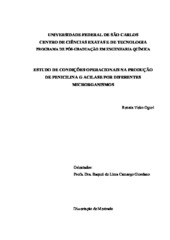Estudo de condições operacionais na produção de penicilina G acilase por diferentes microrganismos
Resumo
Penicillin G acylase (PGA) is an enzyme of major impact in human health for
catalyzing the deacilation of the penicillin G, to yield 6-aminopenicillanic acid (6-
APA), key intermediate in the semi-synthetic antibiotics production. Several
microorganisms produce PGA, but Bacillus megaterium is capable of secreting it to the
medium. PGA from B. megaterium has been studied in DEQ-UFSCar. Xanthomonas
campestris presents in your DNA the genetic sequence that codify acylase penicillin and
tests with a strain of this microorganism from Departamento de Genética e Evolução da
UFSCar showed PGA extracellular production. Studies in PGA production were
initiated with the microorganism stored in DEQ-UFSCar. At the same time, strains of X.
campestris from Coleção de Culturas Tropical (CCT) and Instituto Agronômico do
Paraná (IAPAR) were tested. However, assays with these strains showed little cellular
growth and no enzymatic activity. The microorganism reactivated was send to Fundação
André Toselo for identification. The result showed that the microorganism was Bacillus
megaterium. Therefore, at the same time that realized adaptations tries with the new
strain of X. campestris, studies of production operational conditions of PGA were
performed with strain of Bacillus megaterium, in shaking flasks and bioreactor, as well
the enzyme characterization
Germination/ propagation of B. megaterium experiments, at 30°C, carried out in
shaking flasks showed that the growth time of microorganism in the inoculum step was
24 hours and maximum specific growth rate was µmáx = 0.33h-1. Assays in shaking
flasks were carried out in shaker at 30ºC and 300 rpm intend to determine the most
adequate pH for the enzyme production in both, microorganism propagation phase and
enzyme production phase The results showed that the best pHs among the tested ones
were pH 8.0 and 7.0, for the propagation and production phases, respectively, with 355
IU/L. The culture medium with preferentially consumed amino acids 20,0 g/L,
potassium phenylacetate 3,5 g/L, solution with differents salts 0,22 g/L and cheese
whey 20,0 g/L was the more efficient in PGA production, carried out maximum
cellular growth and enzymatic activity, 4,59 g/L and 592UI/L, respectively, in 36 hours.
Assays in a 2-L bioreactor, with production medium in the presence of amino
acids preferably consumed 10.0 g/L, cheese whey 20.0 g/L, solution of salts 0.22 g/L
and inducer potassium phenylacetate 3.5 g/L, indicated that the addition of nutrients
during the fermentation is a efficient strategy, providing enzyme production increase. In
the study of the influence of oxygen dissolved, carried out in bioreactor too, maximum
enzymatic activity was 451 IU/L with 10% of saturation. Moreover, the maximum
enzyme production was observed in the bioreactor and not in shaking flasks, like in all
experiments until this.
In the stage of characterization of the penicillin G acylase from Bacillus
megaterium, optimum values of temperature and pH were, 47°C and 8.0, respectively.
The Michaelis Menten model fitted resulting in estimated Km and Vmáx parameters
values of 1.51 mM and 1.1*10-3 mmol/min*IU, respectively. The activation energy
estimated was 27.12 KJ/mol.The results showed that PGA from Bacillus megaterium
deactivate completely after 45 minutes of incubation at 60°C and 90 minutes in pH
11.0.
